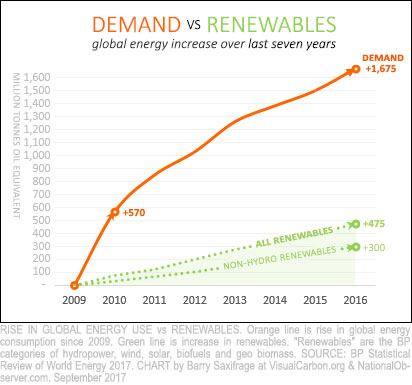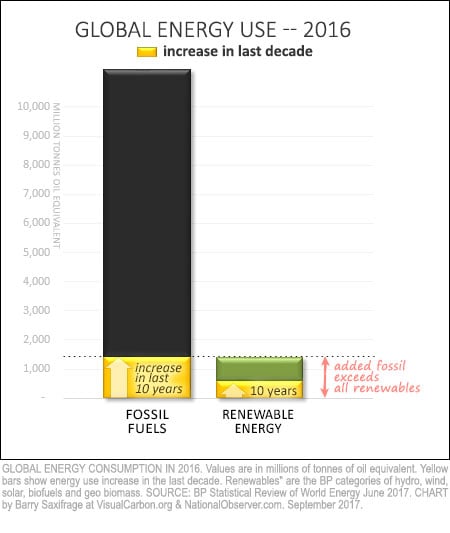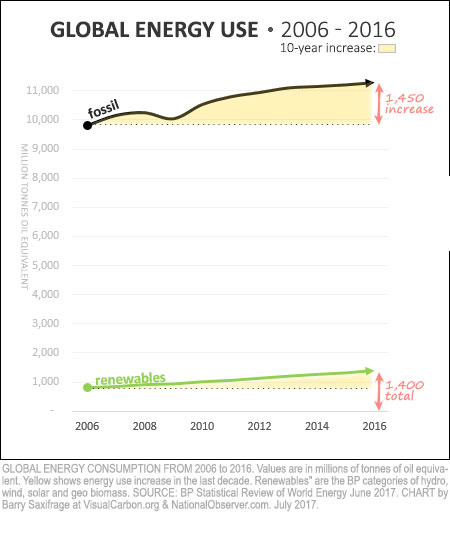Articles Menu

[Editor's note: See comment on this article by Roger Annis below]
I read lots of articles these days pointing to the rapid expansion of renewable energy as a reason to be hopeful about our unfolding climate crisis. Unfortunately, the climate doesn't care how many solar panels and wind farms we build.
The best available science says we need climate pollution "reductions of 90 per cent or more between 2040 and 2070." (see International Panel on Climate Change Fifth Assessment report.)
But the latest energy data clearly shows we aren't reducing fossil fuel burn. Just the opposite. We keep cranking the tap open wider every year. In a recent article, I dug into the latest "BP Statistical Review of World Energy" to illustrate the climate-sobering fossil fuel side of this story:
After reading that article, Canadian energy expert Dave Hughes pointed me to the equally sobering renewable energy side of the story. Here it is.
Hughes notes that while renewable energy is growing, global energy demand is rising much more.

To illustrate, I created this new chart on the right from the BP data.
The orange line shows the increase in global energy demand since 2009.
Compare all that new demand to the top green line showing the increase in renewable energy. As you can see, renewables expanded only enough to cover about a quarter of new demand.
In fact, all the expansion of renewables over the last seven years isn't enough to cover even the single-year demand surge of 2010. Sure that was a big year for demand as the world emerged from a global recession. But those last seven years have also been the all-time biggest years ever for renewable energy.
The situation looks even worse if you don't like the idea of relying on expanding hydropower dams. That's because hydropower expanded more than any other renewable over those years. The lower green line shows the increase from all the non-hydro renewables: wind, solar, biofuels and biomass.
So, any guesses what filled that huge gap between renewables and demand? Yep.
Instead of prioritizing climate-safe renewables, humanity met most of the rising energy demand by burning ever more fossil carbon. My next chart shows the renewables-crushing scale of the recent fossil fuel expansion.
The huge bar on the left shows global fossil fuel burn last year. The tiny right bar shows all renewable energy use last year. Quite a mismatch, eh? But the key thing to notice is the yellow part of each bar. This shows how much each type of energy increased over the last decade.

As you can see, we expanded fossil fuels twice as much as renewables. Actually, 2.4 times more. When people have wanted more energy, they have mostly decided to burn more fossil carbon, not install more renewables.
In fact, as the red arrows show, the last decade’s increase in fossil fuels was so huge that it single-handedly exceeds all the renewable energy supply we’ve ever built.
In other words, all the world's hydropower dams, solar installations, biomass burning, biofuels and wind farms produce less energy than just the recent expansion in fossil fuels.
Here's another chart showing how things have played out over the last decade.

The black line shows fossil fuel use. The green line shows renewables. And, again, yellow shows how much each increased over the last decade.
This chart lets you see how both fossil fuels and renewables continue to rise at the same time.
As with the previous chart, the red arrows point out that fossil fuels expanded more in this decade than all renewables combined have ever expanded.
This chart certainly shows that renewables are growing at a good clip. But it also shows that fossil fuels keep expanding even more. There is no indication here that fossil burning is going start declining rapidly as needed. I don't even see any sign it is going to stop rising!
Instead, the world isn't even coming close to expanding renewables enough to meet the annual increases in energy demand.
Don't get me wrong, I'm a huge fan of renewables. I've got grid-tie solar panels on my roof and I'm an avid daily reader of the renewable energy press. I see renewables as a critical and necessary part of a climate-sane future.
But renewables aren't the metric that will determine our climate future. Renewables can — and currently are — prospering even as fossil fuels expand and we accelerate into the climate crisis.
Focusing on just the positive renewable energy news feels to me like cherry-picking climate hope. It's tempting, for sure, but can distract from what actually determines our climate fate: how much fossil fuel we burn. And by that measure we are still heading ever further from safety while our time to turn around is running out.
[Comment by Roger Annis on ‘renewable energy’, to the System Change Not Climate Change listserve, Sept 20, 2017
Something important is missing from Barry Saxifrage’s important article in the National Observer examining the flawed energy outlook of the International Energy Agency (Fossil fuel expansion crushes renewables, by Barry Saxifrage, National Observer, Sept 20, 2017). His commentary is worded as though a switch by the world to what he calls renewable energy, this would somehow slow and eventually halt reverse rising global emissions. But this is a mirage. I actually doubt that this is the writer’s view (and for the record, he is far, far more informed and experienced than I on matters of global warming). But the wording is there and it is misleading as written.
It is not just the extraction and burning of fossil fuels that is causing the global warming emergency. It is the entire extraction, production and consumption cycle of (capitalist) society, however it is powered.
As we know, the capitalist production cycle is relentless and ever-expanding. This expansionism is inherent to capitalism as a whole. Fossil fuels are the chosen source of power for much of the capitalist expansion of the past 200 years or so (for good, solid capitalist reasons). But if the supply of fossil fuels were to halt tomorrow or at some future point as supply dries up (heaven forbid we should actually arrive at such an end point), then alternative energy sources would take their place. And the whole, destructive cycle would carry on.
(As a sidenote, there is no such thing as ‘renewable’ energy. That would defy the laws of physics. All energy production requires material input. There is ‘more polluting’ and ‘less polluting’ energy. These are ‘more harmful’ or ‘less harmful’ to society, according to society’s judgement. There is no free energy ride.)
With regard to an earlier comment to this listserve, I am very reluctant to offer the term ‘revolution’ on its own as an answer to the global warming emergency. It’s too vague. Ditto, even, for ‘socialism’. I think the answer offered up needs to be something along the lines of ‘revolution (or socialism) that brings about a planned economy and a halt to humanity’s assault on nature’.
One of the big theoretical questions that environmentalists need to examine is the following. What is the world to do about the global warming emergency in circumstances where there is no socialist revolution (ie rational, planned economy) on the immediate agenda in any of the large, most polluting countries? This is one reason why I am keenly interested in studying the New Economic Policy (NEP) which guided the economic development of the early Soviet Union (1921 to 1928). NEP was cut brutally short in 1929 by the rising Stalinist bureaucracy. It dealt with a similar problem that we face today: what is the rational path to social development during the transition period in which the capitalist law of value still holds great sway and power?
The path to climate (societal) salvation is that of emergency retrenchment and related emergency mitigation of the worst of what is to come. I believe this leads inexorably to socialism, ie a planned and social economy. But that is a lengthy process that will take at least several decades (so far in the world, it has taken 100 years!). What are the class alliances that are possible and necessary along that path? Are we dependent, exclusively, on the awakening of the workers and other exploited classes to win political power? Or do we seek the broadest possible class (and national) alliances during the awakening? If so, what would we seek to accomplish? Stopping oil pipelines, oil-by-rail, gas fracking and all the rest is only the beginning of wisdom. For its survival, society simultaneously need big leaps forward–redesigning cities without automobiles; vastly expanding localized food and energy production; learn to grow food without poisoning the soil and water with chemicals; radically reduce air travel; etc. Unless I am mistaken, this is a very unexplored area of Marxism and other radical philosophies (eg anarchism) in this era of global warming emergency. It’s time for a theoretical leap, what I’ve been calling a ‘renewal and revival’ of radical social thought.]